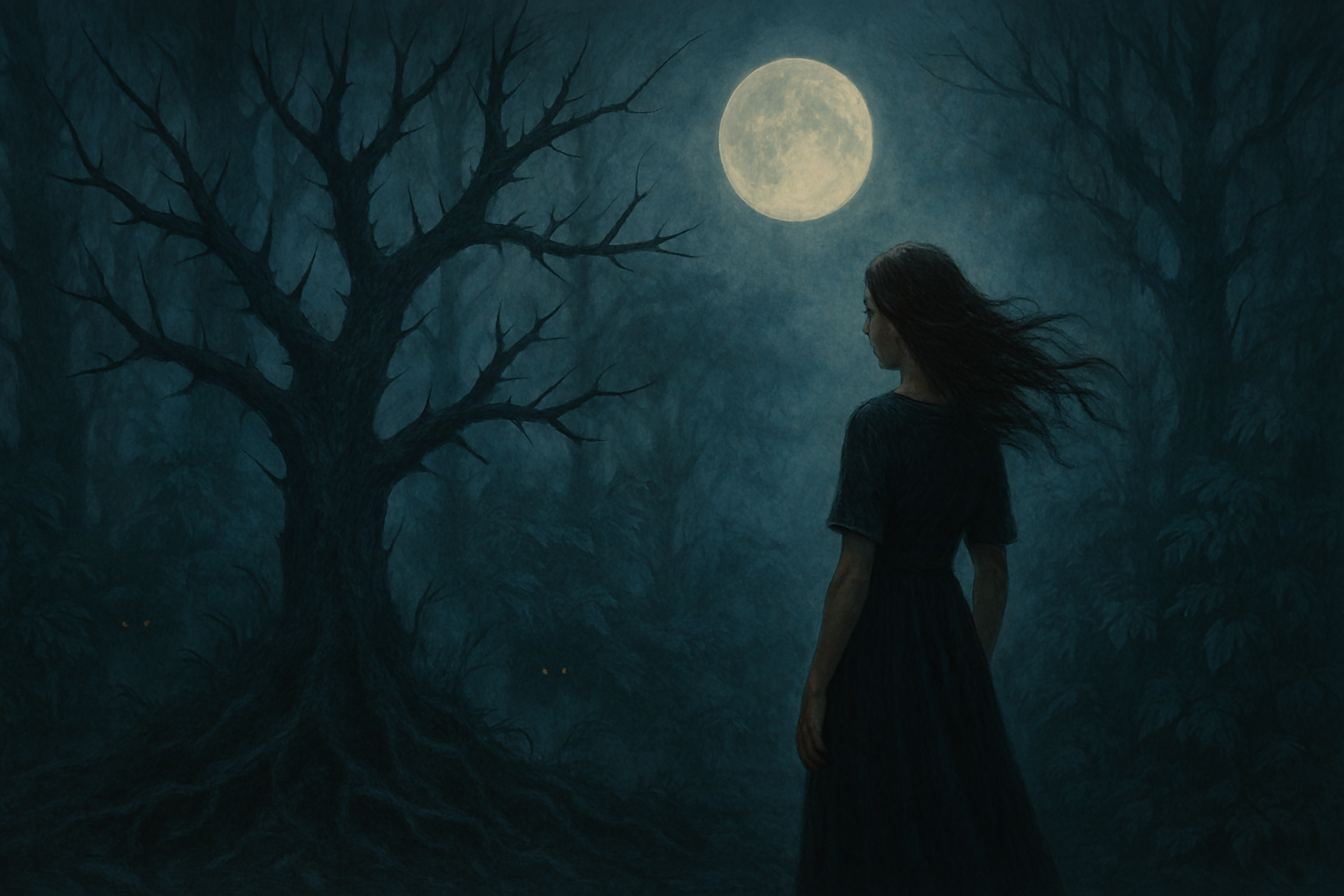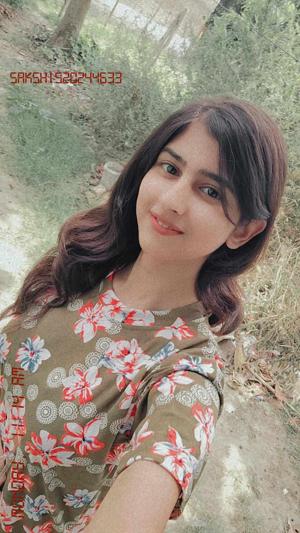
Gurumaa found her at the edge of the Blackthorn, half-swallowed by fog and mud. She moved with the quiet speed of someone who has walked with death and come back to bargain.
“Bhairavī, kahan thi tu?” Gurumaatā hissed, not in anger, but panic. Her voice trembled like thunder holding itself back. She caught Bhairavī before she collapsed fully, her hands gripping her arms skin cold, pulse erratic, veins glowing faintly violet beneath the surface.
The smell of saffron and poison still clung to her lips.
“Ye zahar…,” Gurumaatā’s eyes widened. “It’s not human.”
Bhairavī’s breath came out in broken gasps. “She… Vindhyā…”
“Chup. Bolo mat,” Gurumaatā said sharply, pulling her into the center of the room. She drew a quick sigil on the ground with white ash spiraling into symbols that pulsed like living veins. Her bangles clashed as she moved faster, whispering ancient words that made the air tremble.
The candles bent backward, their flames sucked toward Bhairavī’s body.
Her scream cut through the dark.
The poison fought back. It wasn’t mere venom; it was cursed blood, mixed with moon ash and snakefire, crafted by someone who knew the dark side of ritual. Gurumaatā’s eyes flashed pure gold as she pressed her palm to Bhairavī’s chest. “Mrityunjay ke vanshaj ne tujhe maarne ki koshish ki hai… Vindhyā ne apne haath se……….”
Bhairavī’s eyes fluttered, her voice barely a whisper. “Mujhe… chhod dena… agar… main mar gayi to……”
“Chup!” Gurumaatā snarled, tears forming in the corners of her furious eyes. “Tu Mrignāyinī ki vansaj hai, samjhi? Mrityu bhi tujhe chhoone se daregi!”
She pulled a dagger from the altar, its blade blackened by time. Slicing her own palm, she pressed it against Bhairavī’s mouth. “Pi le, meri shakti teri ragon mein jaayegi.”
The venom hissed, resisting, burning the air as Gurumaatā’s blood touched it. The sigil on Bhairavī’s hand flared, bright crimson, like the forest’s wrath itself had woken up.
The room shook. A mirror cracked. The air reeked of metal and storm.
Gurumaatā gasped as her own sight split into two. She saw through the poison’s memory.
Vindhyā’s reflection flashed before her, standing in her marble hall, stirring the milk with a silver spoon, her face calm, eyes void of guilt.
Then the spell snapped back, leaving Gurumaatā shaking.
“She tried to kill the heir of Blackthorn,” Gurumaatā whispered, trembling with both rage and horror.
She touched Bhairavī’s forehead gently, voice now low and firm. “Ek mahina… tu yahan rahegi. Main tujhe uske liye tayyar karungi. Phir tu jaayegi… aur Vindhyā ka ant likhegi.”
The forest outside roared, as if it had heard the verdict.
Bhairavī’s half-dead lips curved into a faint, cruel smile.
“Ek mahina…” she whispered. “Aur Vindhyā… saans lena bhool jaayegi.”
Suddenly gurumaatā froze.
Her breath hitched as her eyes fell on Bhairavī’s hand. That same sigil, burning faintly red, the one Mrignāyinī once bore. For a heartbeat, she couldn’t breathe. Then realization struck like thunder.
“Ye… ye toh wahi nishān hai,” she whispered, voice breaking. “Mrignāyinī ab bhi zinda hai… teri rooh ke andar. Aur tab tak nahi jaayegi, jab tak uska badla poora na ho.”
The mark throbbed, tasting Bhairavī’s blood like an ancient beast waking from sleep. It hummed softly, and the air around her shifted. The window creaked open, a flame bent toward her, roots stirred beneath the floor.
Gurumaatā’s tears glinted in the candlelight. “Tujhe har haal mein badla lena hoga, nahi to ye bhariyey phir lautenge. Kal Mrignāyinī thi… parso koi aur hogi. Tu hi rok sakti hai, toh ab rok.”
Her words weren’t a command, they were a vow.
Bhairavī looked at the sigil, now alive, burning under her skin. A faint, cruel smile touched her lips. The curse wasn’t her burden anymore.
It was her weapon.
One month passed like a slow incubation.
Bhairavī trained.
Gurumaa taught her rituals to soothe the hunger and how to aim it. She taught her to whisper to roots and command them to remember. They practiced in the sanctum, where incense tasted faintly of iron and time. Between them lay an old map of names. The names of those who had watched Mrignāyinī burn.
Every night, Bhairavī traced those names with trembling fingers until the sigil on her hand glowed warm, answering in whispers only she could hear.
Meanwhile, Vindhyā changed. The poison hadn’t killed Bhairavī, but it had bitten back. Vindhyā’s dreams grew tangled with black vines. She woke one night to find her flowerbeds wilted to ash, though she had watered them herself.
Mirrors fogged when she passed. Candles flickered, refusing to stay lit.
She began to fear her own reflection.
She called priests. She burned sage. She scattered salt in every corner.
But rituals cannot cleanse what the earth remembers.
The Night of Thorns
The night Bhairavī returned, the air trembled, like something buried was waking up.
Stars blinked cold above the marble mansion. Every step she took up those stairs sounded like a verdict. The sigil beneath her sleeve pulsed faintly, as though the Blackthorn itself was breathing through her veins.
Vindhyā opened the door herself , draped in silk, painted calm, but her smile trembled at the edges.
“Kaisi ho, beti? Ab tabiyat kaisi hai? Mujhe to laga tha… tum kabhi nahi aaogi,” she said, her voice thinner than before.
Bhairavī stepped inside. The house fell silent, every wall watching.
“Thank you for the drink, Vindhyā…...aunty,” she said softly. “It showed me things I needed to see.”
Vindhyā froze. “Tum ye kya keh rahi ho, beti? Tum mere liye Mayuri jitni hi khaas ho… waise kya dekha tumne?”
Bhairavī’s smirk was slow, cold, regal.
“Tumhara asali chehra… do-muhe saanp jaisa. Zehrila. Aur mujhe ye chehra pasand aaya. Pata hai kyun?”
She leaned closer, whispering like a promise, “Kyunki main nahi chahti meri dushmani kisi kamzor dushman se ho. Tumhari lomri jaisi chalaki se pyaar ho gaya mujhe… Itna pyar, ke ab tum zinda nahi rahogi.”
Her laughter followed. Clear, cruel, royal. The sound bounced off marble, shaking the chandeliers.
Then the sigil burned bright. Chandeliers dimmed. A single rose on the table turned black, dripping sap. Vindhyā’s breath hitched.
“Tu paagal ho gayi hai!” she screamed. “Kya kar legi tu? Will you kill me? You think you can just walk into my home and……”
The house answered for Bhairavī.
Mirrors cracked, splintering in slow motion. From their fractures bled a black sap that slithered across the floor, thick, alive, hungry. It coiled around Vindhyā’s ankles, then her knees. She shrieked, but the sound broke in her throat.
“Maaza aa raha hai?” Bhairavī’s tone was almost teasing. “Kya kaha tha? Main tere ghar mein kuch nahi kar sakti?
Toh dekh, main to kar rahi hoon.”
The vines rose higher, thorns glistening wet under dying candlelight. They pierced her skin like tiny fangs, crawling upward. Vindhyā clawed at them, her palms shredding. Her bangles shattered; blood trickled, thick and dark.
She stumbled toward Rudrā’s portrait, reaching out like a drowning woman. But the frame disintegrated into dust beneath her touch.
The vines bloomed crimson now, pulsing with her heartbeat.
Vindhyā’s last cry came out as a whisper — “Mayuri…” — before her body stiffened, then cracked, her veins turning black as glass.
Bhairavī watched, calm, divine, untouchable.
The sigil on her hand dimmed again, satisfied.
Outside, the wind howled through the trees, not mourning, but celebrating.
The forest had claimed its second offering.
Then she left walking out of the hall like she had never entered, the echo of her heels swallowed by the Blackthorn wind. Outside, the crows were loud, their cries a single, satisfied chorus.

Write a comment ...